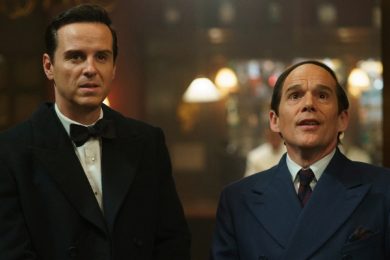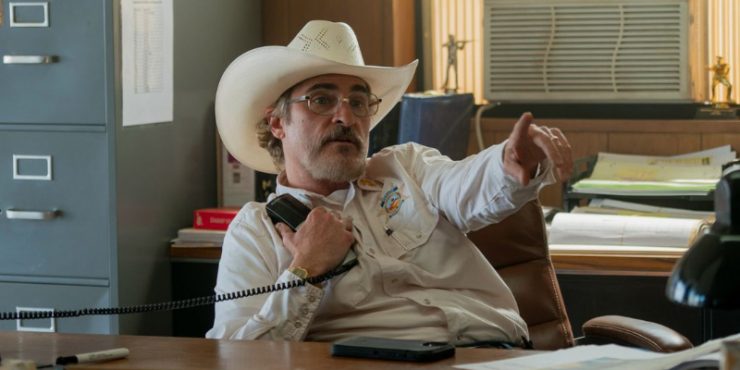A lot of us broke in 2020, but it’s been the years since – the years that proved that all the sacrifice, anguish, protest was ultimately for naught, and that everything was going to be a worse version of the status quo – that have truly broken me. I assume I’m not unique in this way. The initial months of the COVID-19 pandemic, followed by a Summer of mass scale protests against police brutality and white supremacy, followed then by a massively consequential (and massively dramatic) presidential election, was a lot for any one human to comprehend. The detritus of that chaos has come together to form what is now our current desperate moment, five years later.
Ari Aster’s Eddington takes place a month into the pandemic, when there was still much unknown about the virus, other than the shocking mortality rate. The titular town is a rural, desert community where the mayor, Ted Garcia (Pedro Pascal), has just ordered a mask mandate for the entire population. This irks the city’s sheriff, Joe Cross (Joaquin Phoenix), who sees the mandate as a trampling of American freedom. This disagreement, the face-off between Ted’s state-sanctioned compliance and Joe’s reactionary defiance will be an uneasy reminder of what those days in 2020 were like. I certainly remember watching conservative voices rail against masks, while watching New York City fill meat trucks with the bodies that no longer fit in the overflowing hospitals.
A common refrain I remember from those days is lots of people expressing that they have “no interest” in ever watching a film or television show depicting the ravages of this virus. I replied that time will pass and eventually there will have to be art that confronts this tragic era in some way, and there has been. But Aster is doing something different. He’s taking the most discomforting aspects of the pandemic and forcing us to watch it replay itself. It is a work of fiction, but one that is so connected to our tainted realities that it will resurrect uneasiness not felt until those scary, painful days. What’s the point of this exercise? Well, I think our failure to capitalize on the collective horror we all experienced is in large part due to our refusal to accept that it really happened to us. Eddington is a film that wants us to truly “never forget”.
On its face, Eddington‘s Joe vs Ted binary feels like a classic red vs blue send-up that will allow Aster to satirize both sides of the political spectrum. That is until we learn the various ways that Sheriff Cross has been made to feel small both in his personal life and within larger social politics. (One small detail: Joe’s asthma makes wearing a face mask very difficult.) We also get info that Ted’s re-election campaign is funded by a tech company that hopes to build a data center in the nearby desert. Feeling alienated by Ted’s liberal smarminess, Joe decides that he’s going to run for mayor himself. The choice is a surprise to many, including Ted who’d anticipated running unchallenged. Joe’s decision also disrupts his home, which includes his wife, Lu (Emma Stone), who has a history with Ted that she doesn’t want dredged up within the fallout of a political campaign.
Joe is not qualified to be Eddington’s mayor. He’s hardly qualified to be the sheriff. Through anecdotes we learn that the jobs within the very small Eddington police department are dictated by nepotism. One of his deputies, Michael (Michael Ward), is the son of a former sergeant, and Joe only got the sheriff gig after the former sheriff (his father-in-law) passed away. Joe is frequently reminded of this fact by his mother-in-law, Dawn (Deirdre O’Connell), who lives with Joe and Lu since the arrival of the pandemic. Dawn is a caustic consumer of conspiracy who hardly misses a moment to spit out he resentments toward Joe and manipulations toward Lu. Under her influence, Lu begins to watch videos by the handsome but sinister numerologist Vernon Peak (Austin Butler), who may be running a cult.
Joe’s lack of skill as a politician is immediately apparent, and it only shines a brighter light on all that’s out of control throughout his life. Because this is an Ari Aster film, we know there will be a major destabilizing moment that will shock the audience. And that does happen about halfway through Eddington, as Joe starts making drastic decisions which only further descends his wayward life into mayhem. It’s at this moment that Aster’s version of satire kicks into high gear. That both conservatives and liberals become fodder in the film’s humor doesn’t mean that Eddington is appealing to some form of both-sides centrism. Instead, Aster understands that our current dilemma (and this movie is very much about our current 2025 dilemma as much as it’s about 2020) is the result of larger powers on both sides of the aisle refusing to sacrifice their own political power for working class repair.
Maybe the most provocative choice is to include the real life tragedy of the murder of George Floyd by police officers in Minneapolis. Floyd’s death was the catalyst for a sea of protests in the Summer of 2020 and the Black Lives Matter movement. The protests reached the farthest corners of the US, including, according to this film, Eddington, New Mexico. These demonstrations are small, but passionate, lead by the teenaged social justice influencer, Sarah (Amélie Hoeferle). Sarah catches the eye of Brian (Cameron Mann), the best friend of Ted’s son, Eric (Matt Gomez Hidaka). A sophomoric love triangle plays out between the three of them, adding a dollop of frivolity to their righteous cause. Eddington gets good laughs out of Sarah’s performative anti-racism.
This film isn’t a political polemic, though it does understand the failure of contemporary politics to make civilian life better in any form. Joaquin Phoenix’s Joe is something like a Coen Brothers character in his ample fallibility, and his laser like focus on being hoisted by his own petard. I’ve not yet forgiven Phoenix for what he did to the now-dead Todd Haynes vehicle that he abandoned last year (and probably never will), but he’s still amongst the greatest actors of his generation, and one of the few that could play this part this well. Aster’s anti-hero is not the obvious dope, but a desperate and vulnerable man who uses the only tools he feels are at his disposal. He has genuine reasons to behave the way he does, but society’s refusal to let him have a voice drives him toward extreme measures.
Now, his actions are also unforgivable in very basic ways. I’m sure many a viewer will struggle with the idea that we’re meant to sympathize with him at all. I don’t think sympathy is required to understand that Joe Cross is a character that represents a lot of white men in this country, their egos determining the fates of so many in this world. It’s a character that’s easy to hate, and even easier to dismiss. But where does the dismissals of the world’s Joe Crosses lead us? If this were a Coen Brothers movie, the larger universe would find a way to dispose of Joe, likely in a very funny way. But Aster wants us to sit with the discomfort of knowing that our lives are dictated by emotionally fragile men like Joe, and shame memes will not make them go away.
.
Written and Directed by Ari Aster










